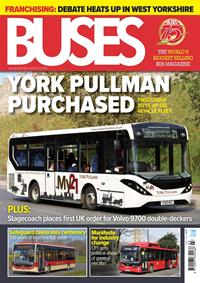|
|
Contents Listing - Articles & Features in this issue
Editorial
Transport in Wales: the way ahead
Rhufon
Scania saloons for Newport
Voith in Ireland and Scotland
The modern trolleybus - T. E. Box
Preservation news special: Rally calendar 1983
Dates to note
Stamps & buses
Philaticus
Book reviews
Letters
News matters
Bus & coach developments
Registration notes - Gordon Watts
London Transport News - Julian Bowden-Green
Pictureview
Fleet news
English & Welsh operators - Gordon Watts
Scottish operators - David G. Wilson
Irish operators - Ft. C. Ludgate
Preservation news
Article Snippets
Letting the bus take the strain:
YET MORE fuel was added to the increasingly popular belief that this is the age of the coach with the publication of the Serpell report into railway finances in January. The media were very quick to seize upon the idea that 85% of the existing railway network could be swept away to create a profitable rail network, which in actual fact was only one of several options proposed by the committee to improve BR's commercial performance. In the unlikely event of that option being chosen, it is more than possible that the bus industry would be quite unable to cope with the extra passenger loads thus generated or the vast increase in road traffic, both passenger and freight, which would inevitably follow.
What the bus operator would stand to ( benefit from would be a more reasonable pruning of the network, involving the substitution of some rail services by buses, which is one of the suggestions of the report. It would, says the report, be more cost-effective to meet the limited demand for public transport in many areas with a bus rather than a train. Often trains carry an average load of only 30 passengers on provincial services, whilst bus operating costs are quoted as being only a quarter of those for rail. Thus the economic arguments are strong.
The recommendations of the report as to the form such bus replacements would take are remarkably similar to those suggested by two NBC speakers at a transport planning conference in Warwick last year (Buses September 1982, p406). As the cost savings would be so great the report says that 'it would be possible to chose from a full range of modern vehicles'. Thus it is clear that the Beeehing-style rail replacement buses are not what the Serpell committee has in mind. The new services would be part of the rail time-table, would not necessarily follow the rail route (to enable new communitites not previously served by rail to be linked into the rail network) and would include through booking facilities. Such services would operate on a limited-stop basis to achieve fast journey times.
In order that full integration with the rail network be achieved British Rail would be responsible for providing the services. However the report recommends that existing bus companies should actually run them, so that BR would not then be faced with having to learn new skills as a bus operator. Whilst in practice this would often mean that replacement services would be operated by NBC/SBG, there is no reason why private operators should not also be involved, especially as in certain circumstances this could reduce costs. A minimum level of service would be specified; this would include a maximum fare level and minimum frequencies; also, rather surprisingly the report suggests that it would specify minimum safety standards. Does this imply that existing psv safety standards are considered inadequate, we wonder? Funding for rail replacement services would come from central Government sources and would be channelled through BR, rather than coming through local authorities. They would be run for a minimum of three years, thereby assuring the public of a degree of continuity. Central Government funding would also create an impression of stability. It would also mean that BR could retain control over the siting of bus stops; were a local authority responsible for funding the service it would, quite rightly, specify its own stopping places in certain cirumstances at least and this could detract from the high-speed nature of the services which would be essential. However new legislation would be required to enable central Government to fund such a service. Replacement services- would be subject to the same withdrawal procedures as apply to rail services. Perhaps the Leyland National plant could now pin its hopes on a road-based version of the BR 141-class dmu for rail replacement work
YET MORE fuel was added to the increasingly popular belief that this is the age of the coach with the publication of the Serpell report into railway finances in January. The media were very quick to seize upon the idea that 85% of the existing railway network could be swept away to create a profitable rail network, which in actual fact was only one of several options proposed by the committee to improve BR's commercial performance. In the unlikely event of that option being chosen, it is more than possible that the bus industry would be quite unable to cope with the extra passenger loads thus generated or the vast increase in road traffic, both passenger and freight, which would inevitably follow.
What the bus operator would stand to ( benefit from would be a more reasonable pruning of the network, involving the substitution of some rail services by buses, which is one of the suggestions of the report. It would, says the report, be more cost-effective to meet the limited demand for public transport in many areas with a bus rather than a train. Often trains carry an average load of only 30 passengers on provincial services, whilst bus operating costs are quoted as being only a quarter of those for rail. Thus the economic arguments are strong.
The recommendations of the report as to the form such bus replacements would take are remarkably similar to those suggested by two NBC speakers at a transport planning conference in Warwick last year (Buses September 1982, p406). As the cost savings would be so great the report says that 'it would be possible to chose from a full range of modern vehicles'. Thus it is clear that the Beeehing-style rail replacement buses are not what the Serpell committee has in mind. The new services would be part of the rail time-table, would not necessarily follow the rail route (to enable new communitites not previously served by rail to be linked into the rail network) and would include through booking facilities. Such services would operate on a limited-stop basis to achieve fast journey times.
In order that full integration with the rail network be achieved British Rail would be responsible for providing the services. However the report recommends that existing bus companies should actually run them, so that BR would not then be faced with having to learn new skills as a bus operator. Whilst in practice this would often mean that replacement services would be operated by NBC/SBG, there is no reason why private operators should not also be involved, especially as in certain circumstances this could reduce costs. A minimum level of service would be specified; this would include a maximum fare level and minimum frequencies; also, rather surprisingly the report suggests that it would specify minimum safety standards. Does this imply that existing psv safety standards are considered inadequate, we wonder? Funding for rail replacement services would come from central Government sources and would be channelled through BR, rather than coming through local authorities. They would be run for a minimum of three years, thereby assuring the public of a degree of continuity. Central Government funding would also create an impression of stability. It would also mean that BR could retain control over the siting of bus stops; were a local authority responsible for funding the service it would, quite rightly, specify its own stopping places in certain cirumstances at least and this could detract from the high-speed nature of the services which would be essential. However new legislation would be required to enable central Government to fund such a service. Replacement services- would be subject to the same withdrawal procedures as apply to rail services. Perhaps the Leyland National plant could now pin its hopes on a road-based version of the BR 141-class dmu for rail replacement work
Adverts and Links based on this content
Advertisement



